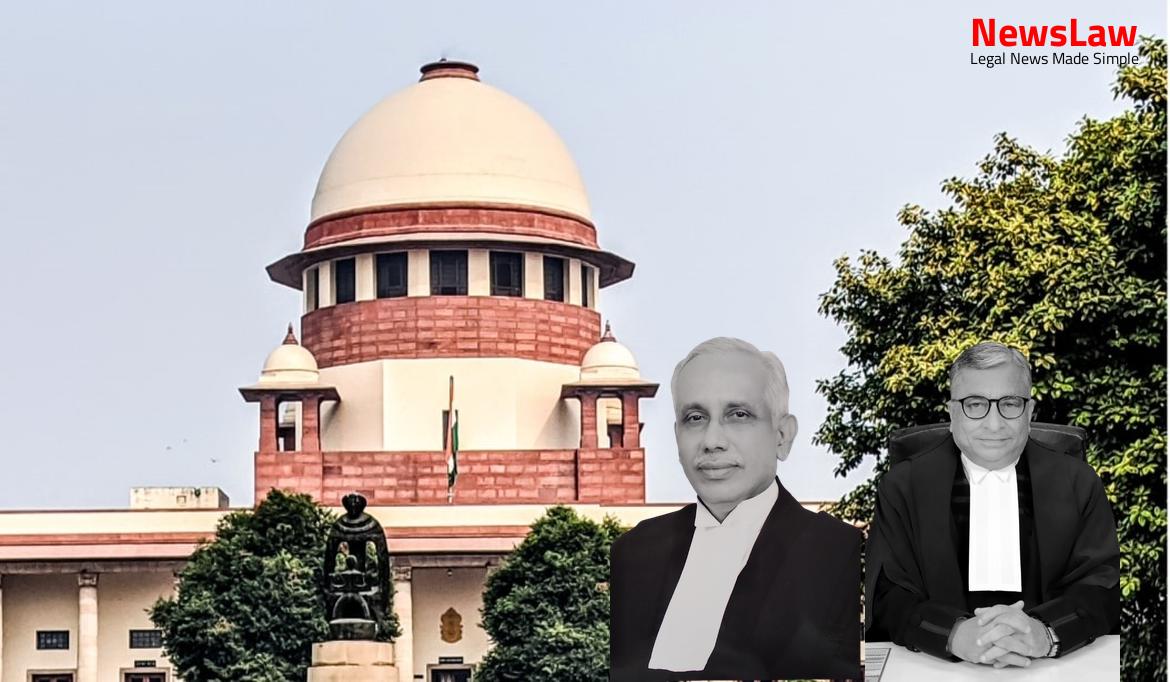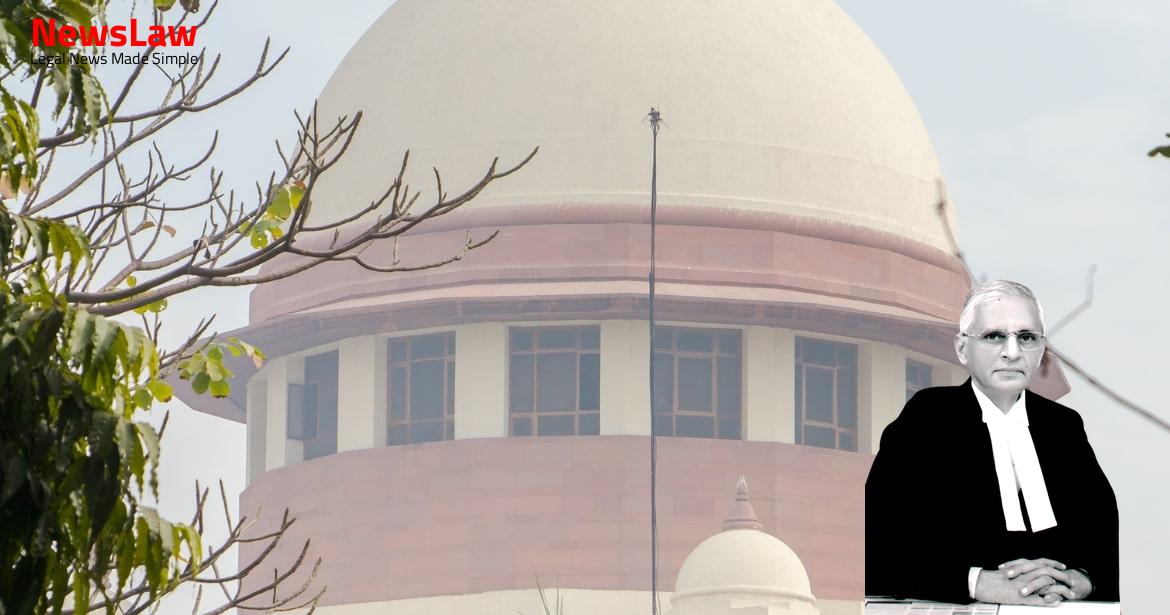Delve into the intricacies of a recent court judgment that scrutinized the quashing of FIR and criminal proceedings in a commercial dispute case. The court’s legal analysis meticulously examines the essential elements necessary to establish criminal intent under relevant IPC sections. This summary encapsulates the court’s reasoned approach in evaluating the allegations presented in the case.
Facts
- Respondent No 2 filed a protest petition against closure report dated 04.03.2014 and further investigation was directed.
- Respondent No 2 filed a complaint under Section 68 of the Companies Act in Tis Hazari Court, New Delhi.
- A quashing petition was filed by the Appellants seeking to quash FIR No 168 dated 28.03.2013 and proceedings in GR Case No 1221 of 2013.
- High Court issued notice and stayed further proceedings of the criminal case.
- Mutual agreement between the parties for Respondent No 2 to invest Rs. 2.5 crore with the company in exchange for shares.
- Priknit Apparels Pvt. Ltd. was formed in 2002 and later changed to Priknit Apparels in 2007.
- Another notice sent to Appellant No 1 and 2 for relevant documents, and full cooperation extended for investigation.
- Respondent No 2’s complaint transferred to PS Darya Ganj, New Delhi.
- Respondent No 2’s complaints deemed civil in nature by MM, Tis Hazari Court, New Delhi.
- Second complaint by Respondent No 2 in Kolkata converted to an FIR under several sections of IPC.
- Legal notice issued by Respondent No 2 after failure to fulfill the investment agreement.
- Appeal filed against High Court judgment in C.R.R No 731 of 2017.
- Allegations of inducing investment through misrepresentation mentioned in FIR against the petitioner.
- Application for vacation of stay order by Respondent No 2 dismissed, citing harassment intent towards Appellants.
- The High Court dismissed the prayer for quashing of the proceedings.
- The High Court held that the continuance of criminal proceedings against the appellant would not be an abuse of the process of the court.
- The High Court also dismissed the revision petition filed by the appellants.
- The High Court stated that the exercise of power under Section 482 Cr.P.C requires assessing if the continuance of criminal proceedings would be a total abuse of the court’s process.
- The High Court found that the continuance of criminal proceedings against the appellants was not an abuse of the process of the court.
Also Read: Assessment of Loss of Earning Capacity in Motor Accident Claim
Arguments
- Appellants argue that there are no allegations of fraudulent or dishonest intentions in the complaint by Respondent No. 2.
- The complaint is seen as a contractual dispute rather than criminal in nature, as alleged by Respondent No. 2.
- The transaction between the parties was a commercial one, not involving cheating as per IPC.
- Allegations mentioned in the complaint are related to belated share allotment and failure to bring out an IPO, which are commercial disputes.
- Failure to fulfill a promise does not automatically imply criminal intent under IPC Sections 409 or 420.
- Respondent No. 2 is accused of forum shopping by filing complaints in different locations with similar content.
- The complaint filed in Calcutta was a replica of the one filed in New Delhi, with only the place of occurrence being different.
- The Respondent’s representative argued that the allegations in the complaint fulfill all the elements of the alleged offenses.
- It was emphasized that the initiation of criminal proceedings was not done with malicious intent.
- The Respondent’s complaint filed in Kolkata was after a rejection of the prayer under section 156(3) Cr.P.C by the Delhi Court.
- The legal proceedings in Kolkata were sought to avoid multiple proceedings after further investigation was allowed.
- The withdrawal of the complaint in Delhi was to prevent multiplicity of proceedings.
- The argument was made that two complaints can co-exist if their scopes are different, citing the judgment in K. Jagadish Vs. Udaya Kumar G.S. & Anr.
- The Respondent alleged that they had parted with a significant amount of money based on false promises by the accused.
- The principle of quashing was mentioned, emphasizing that at the stage of cognizance, the court should only assess if a prima facie offense is established.
Also Read: Enhancement of Compensation in Workmen’s Compensation Act Case
Analysis
- The complaint and chargesheet do not establish offences under Section 405 & 420 IPC, 1860.
- No malafide intention is evident from the MOU dated 20.08.2009 between the parties.
- The absence of a culpable intention at the time of making a promise negates an offence under Section 420 IPC.
- The complainant filing complaints in both Delhi and Kolkata is considered an abuse of the legal process.
- The High Court’s decision to dismiss the application under Section 156(3) Cr.P.C is upheld.
- Jurisdictional manipulation was observed in the complaint filed in Kolkata to create a new cause of action.
- Lack of evidence for deception or dishonest inducement invalidates the charges under Sections 406, 420, and 120B IPC, 1860.
- The timeline of complaints indicates a malicious intent to pressure the defendants.
- Omission of material facts in various complaints points towards malafide intentions of the complainant.
- The court holds jurisdiction based on the location of the complainant company.
- The High Court can exercise its inherent powers under Section 482 Cr.P.C. to quash the FIR only in specific circumstances.
- The circumstances under which FIR/complaint can be quashed include when the allegations do not constitute any offence or make out a case against the accused, when the allegations do not disclose a cognizable offence justifying investigation, and when the allegations are absurd or inherently improbable.
- Quashing of a complaint is not warranted to stifle a legitimate prosecution but can be done in cases of abuse of the process of court or when the allegations are mala fide or malicious.
- It is important for the High Court to exercise caution and not embark on an inquiry into the merits of the allegations before allowing the investigating agency to complete its task.
- Cheating under Section 415 of the IPC requires deception of a person to deliver property or consent to retain property.
- Essential ingredients of cheating include fraudulent or dishonest inducement and causing harm to the deceived person.
- Section 420 of the IPC deals with cheating and dishonestly inducing the delivery of property or valuable securities.
- Inducing delivery of property or valuable securities through cheating can lead to imprisonment and fine under Section 420.
- Accused must induce the person to perform acts they would not have done otherwise to establish the offence of cheating.
- In order to establish the ingredients of Section 406 and 420 IPC, complainant must show intention to cheat or defraud from the inception.
- Complainant must prove wrongful loss due to alleged cheating and resulting wrongful gain for the accused.
- Without these elements, no legal proceedings are permissible for the offence under Section 420 IPC.
- Complaint was filed after a significant delay of almost 4 years with the aim to harass the petitioner and lacks truth.
Also Read: Determining Compensation in Motor Accident Claim Cases: Legal Analysis
Decision
- The impugned FIR No 168 dated 28.03.2013 and proceedings in the file of CMM, Kolkata, West Bengal in pursuance of charge sheet dated 14.02.2017 against the appellants for the offences under Section 406, 420, 120B IPC have been quashed.
- The impugned order dated 01.10.2019 passed by the High Court has been set aside.
- As a result, the appeal has been allowed.
Case Title: VIJAY KUMAR GHAI Vs. THE STATE OF WEST BENGAL (2022 INSC 326)
Case Number: Crl.A. No.-000463-000463 / 2022



